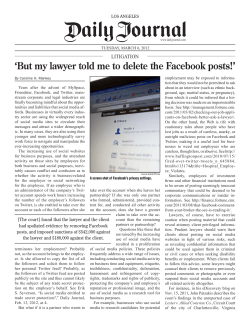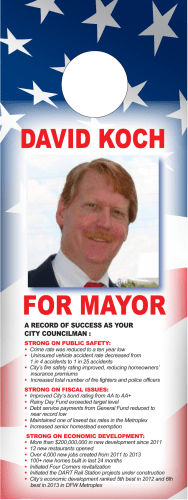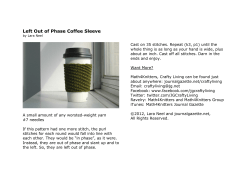
F I L
May, 2013 VOL. 7, ISSUE 2 FACEBOOK AND INSURANCE LITIGATION By Cary N. Schneider Cary N. Schneider is a partner at Beard Winter LLP who specializes in accident benefit and tort defence claims. He focuses on being effective and efficient in his law practice with the goal of achieving excellent results for his clients in a timely matter. Your comments are appreciated and If there are any accident benefits or tort topics that you would be interested in reading about, please feel free to email me and I will certainly explore the possibility of writing an article. Facebook photos at trial is found in the decision of Kourtesis v. Joris (2007). In that case the claimant testified that following the motor vehicle accident that her social life had been ruined. In midst of trial the defence discovered, (and by way of motion gained access to), her Facebook website. The private profile pages contained numerous damaging visual evidence including pictures of her brother hoisting her up during a The best defence that an insurer has in a personal injury case is capturing the claimant in live picture doing something that he claims he cannot do. Historically surveillance has been the best and only means of achieving this. chance Yet surveillance revolves around the opportunity that you capture the claimant on that particular day doing something significant. The advent of the popular social phenomenon Facebook and other social media sites has given the insurer a new tool to take a peek into the private life of a claimant. If the private photographs posted by a claimant on their Facebook page can be used against him vacation in Greece, partying three months before trial on St. Patrick’s Day, and 32 further pictures of her having fun. When questioned about these pictures at trial she provided detailed and thorough explanations for each. Rather then helping her case, the Court found that this called into question her allegations of memory loss. At the conclusion of trial the Judge found that the claimant had not crossed the threshold and part of his reasoning was on the basis that the photos were “completely at odds, even if inadvertently so, from the balance of evidence of the plaintiff”. at trial, this would be hugely damaging to his case. The key question is whether an insurer is entitled to access these Facebook photos. It is important for an adjuster to understand the law with respect to the production of a private Facebook profile in order to provide A prime example as to the successful use of BEARD WINTER LLP DEFENDER MAY, 2013 Facebook and Insurance Litigation direction to their counsel and to conduct their Although the insurer lost its motion for the own investigations. production of the Facebook account, it is clear that the Court was making a decision based on Entitlement To Facebook Profile In Tort Cases the evidence at hand. There have been quite a few somewhat photographs revealed the claimant actively conflicting cases that have addressed the participating in activities then perhaps the Court entitlement to a claimant’s Facebook; none of would have ordered them to be produced. In which coming from the Court of Appeal. This those circumstances there would have been a means that Judges still appear to have free judicial decision that the photographs were reign to decide whether to order the production significant and this could have been used at trial of against the claimant. a Facebook account and in what Had the sealed circumstances. In Stewart v. Kempster (2012) In Leduc v. Roman (2009) the Court took a more the defence discovered that the claimant had a liberal approach to the production of the Facebook account but did not know the contents Facebook account. Similar to the Stewart case, of same; and sought to find out by way of the defence only knew that the claimant had a motion. In an interesting twist, claimant counsel Facebook swore an affidavit that the Facebook account did contents. Unlike in Stewart, the Court found that not anything the mere existence of the Facebook website is substantial and then filed the pictures in a enough to warrant the production of the sealed envelope for the Judge to take a look at photographs: reveal the claimant doing to decide for himself. The Judge looked at the website but nothing about the “A party who maintains a private, or limited pictures, (defence was not allowed to see them), access, Facebook profile stands in no different and agreed with the Plaintiff that there was position than one who sets up a publicly-available nothing of substance in the pictures and that profile. Both are obliged to identify and produce they need not be produced. any postings that relate to any matter in issue in an action…It is reasonable to infer that his social The Judge explained that the Defence was networking site likely contains some content obligated to prove that the pictures are “relevant relevant to the issue of how Mr. Leduc has been to any matter in issue” and that it had failed to able to lead his life since the accident. do so. He found that “an injured person and a To permit a party claiming very substantial perfectly healthy person are equally capable to damages for loss of enjoyment of life to hide sitting by a pool in Mexico with a pina colada in behind self-set privacy controls on a website, the hand. A photograph of such an activity has no primary purpose of which is to enable people to probative value”. Further, the Court found that share information about how they lead their social there was a real privacy interest in the content of lives, risks depriving the opposite party of access her Facebook account and that the claimant had to material that may be relevant to ensuring a fair permitted “only” 139 people to view her private trial.” content. BEARD WINTER LLP DEFENDER The Court found that it is reasonable to infer that 2 MAY, 2013 Facebook and Insurance Litigation the claimant had posted pictures of himself compared to where there is a claim for non- engaged in social activities on his Facebook site earner benefits. and determined that these need to be produced. The Director’s Delegate indicated that there are This decision has been followed in many cases inherent privacy concerns for a claimant that such as McDonnell v. Levine (2011) and must be considered and that a legal entitlement Parsniak v. Pendanathen (2010). to such information must be established. In In Murphy v. Berger (2007) the claimant had contrast to the Court’s decision in Leduc, the posted Director’s pictures of herself on her public Delegate found that the mere Facebook profile and was intending on relying at existence of a Facebook account is insufficient trial of pre-accident pictures of herself. for a production order. In response, the defence wanted access to her With that being said, the Facebook account was private Facebook profile and the claimant refused. ordered to be produced in this case. The Court reasoned that there likely The claimant had posted pictures of himself zip lining are pictures of the claimant in her private profile on a publically accessible Hi5 social network site and these are produceable in light of the fact and these pictures were deemed relevant with that the claimant is relying on her own pictures. respect to the claimant’s alleged limitations. It In response to the concerns about privacy the was found that, “I see no error in extending the Judge found as follows: inference from unrestricted access documents “I have concluded that any invasion of privacy is on one site to restricted access documents on a minimal and is outweighed by the defendant’s similar site”. The claimant had not provided any need to have the photographs in order to access evidence of the sensitivity or specific prejudice the case. The plaintiff could not have a serious of the photographs in the private profile. expectation of privacy given that 366 people have In Prete v. State Farm (2010), the Arbitrator been granted access to the private site.” found that the existence of a Facebook profile Entitlement To Facebook Profile In Accident alone is not sufficient grounds for the production Benefits Cases of the contents contained therein. The production requirements found in the Rules of The entitlement to a claimant’s Facebook site is Civil Procedure for matters commenced in a little more difficult to access in the accident litigation are not the same as the Dispute benefits world. In Rakosi v. State Farm (2012) Resolution Procedures for matters commenced the Director’s Delegate points out that there must be a reasonable, rational relationship between the records sought and the dispute in Arbitration. While as the court decisions of Murphy Leduc and revolved around the production of an affidavit of documents, no such being arbitrated. For instance, if a claim is only requirement is found in Arbitration. being made for medical and rehabilitation benefits it would be more challenging to prove The Arbitrator found that the public profile page the entitlement to a Facebook account as did not show anything relevant to the issues in BEARD WINTER LLP DEFENDER 3 MAY, 2013 Facebook and Insurance Litigation dispute; namely income replacement benefits the Facebook photos without notifying the and housekeeping. As such, the Arbitrator Plaintiff of the motion. The point of taking such concluded that the insurer has failed to establish action was to preserve the private account a reasonable relationship between the images without alerting the Plaintiff that they were on the claimant’s restricted portion of his coming after him. The Court refused to produce Facebook account and the issues to be the records or preserve the private site. First, arbitrated. Issues were also raised as to the the Court disagreed with the reasoning in Leduc procedural quagmire to set guidelines for that the mere existence of a Facebook page is preservation / production of the photographs evidence that it contains information relevant to and sensitivity concerns. the claim. Second, the Court did not agree that bringing a motion without notice to the Plaintiff On the other hand, in the decision of Wice v. was appropriate. The Dominion of Canada (2009) the Court, (the The Court found that there was no evidence to suggest that the Plaintiff claim was in litigation not arbitration), followed was likely to delete content from her Facebook more closely the more liberal decision of Leduc profile pending trial. and allowed the accident benefits insurer to obtain access to the claimant’s Facebook page. Perhaps a different Judge would be more The Court found that the “claimant’s ability to receptive to the relief sought by an insurer function in a wide range of social situations may comparable to the case in Schuster. be circumstantial evidence from which a trier of What remains to be litigated at this stage is fact could draw an inference about his ability to determining if a Plaintiff has deleted pictures function in the defined circumstances in issue”. from his Facebook page. The insurer had demonstrated that there are most helpful of all. If a defendant were to gain relevant photographs of the Plaintiff participating access to pictures that the plaintiff had deleted in social activities posted on his Facebook profile. This would be the from his Facebook page that showed him The court inferred that the private engaging in high level activities then this would Facebook account may also include relevant be highly damaging for two reasons. photographs and ordered it to be produced. First, it would show him being active and second the plaintiff would be caught attempting to destroy Preventing A Claimant From Deleting The evidence that he knew was hurtful to his case. Facebook Profile There may very well be technological means of One of the challenging aspects of gaining determining if pictures have been deleted and access to a claimant’s Facebook page is the giving re-birth to same. concern that he will delete the account to Conclusion prevent it from being produced. In Schuster v. Royal & Sun Alliance Insurance (2009) the The case law is still in flux regarding what an defence took the unique approach by bringing a insurer needs to prove in order to gain access to motion for the preservation and production of BEARD WINTER LLP DEFENDER 4 MAY, 2013 Facebook and Insurance Litigation a claimant’s private Facebook page. Some print off the relevant pictures. cases have indicated that the mere existence of Plaintiffs are now routinely advised by their a Facebook account warrants the production of counsel the pictures, while as others suggest that an something relevant contained are being deleted. that Your lawyers should be site post loss. A claimant’s verbal response accident benefits case that has proceeded in one the whether anything has been deleted from the obtain production of the Facebook account in an to seek a Facebook, (or other social media sites), but others found the opposite. It is more onerous to opposed may advised not only to ask about the existence of concerns that trump the probative value and as insurer are becoming private and damaging pictures within. Some Judges have found that there are privacy arbitration an production of their Facebook site. Public sites insurer must somehow establish that there is likely that or body language may insinuate that they has have proceeded in litigation. It is easier to obtain the something to hide. This simple intimation may clue in to the insurer that the production of a Facebook account in a tort claim claimant may be more active they he lets on; then in an accident benefits case. and lead to significant credibility issues. If an insurer obtains internet pictures of the If we are able to use the claimant’s own vanity claimant engaged in functional activity by way of of projecting his life into pictures against him, a public site, then this will be very influential in then he deserves what is coming. securing access to a private Facebook site. The Just like third party surveillance is an invaluable tool to theory is that if a claimant posts pictures of defend a case, so too is the surveillance that himself publicly that his private site likely a Plaintiff takes of himself. contains something similar. When adjusting a claim an insurer should on a routine basis turn their mind towards running a internet search on its claimants. Not only should we check to determine if the claimant has a Facebook site (public or private), but whether there are any internet related stories, information, or pictures that allow us to know more about the claimant. Contact us at It is improper for an insurer, (or an agent of [email protected] an insurer such as an investigator), to become Disclaimer: Facebook “friends” with the claimant after the The contents of this issue are provided for interest only and are not to be considered as, in any way loss in order to gain access to a private providing legal advice to the readers by Beard Winter LLP account. or the individual authors of articles contained herein. All However, if the insured (in a tort readers are strongly advised to obtain independent legal claim) was already Facebook “friends” pre advice on any issue of concern to them from competent and post loss with the claimant then I believe legal counsel in Ontario. that an insurer is entitled to have the insured BEARD WINTER LLP DEFENDER 5 MAY, 2013
© Copyright 2026









